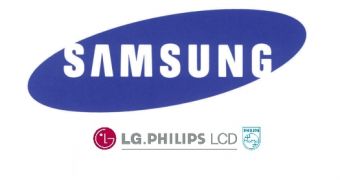It's not exactly a secret that Samsung and LG.Philips are two of the world's most important manufacturers of various LCD displays, a business that's becoming increasingly lucrative, due to the fact that almost all electronic devices released on the market nowadays also come packed with some form of display. However, a recent study has unveiled the fact that things are a lot worse than previously thought, at least from the point of view of the two companies' competitors.
Thus, as Kim Yoo-chul for The Korea Times informs us, a recent report issued by DisplaySearch reveals the fact that Samsung Electronics has sold liquid panels worth no less than $2.03 billion solely in October, hence maintaining its leadership position for the 30th month in a row. Nevertheless, this October did mark an important milestone for the company, namely the first time when the sales went over the 2-billion threshold.
"What is impressive is that sales of large-sized panels rose 11 percent from the previous month to 8.9 million units, beating Taiwan-based AU Optronics with a gap of 200,000,'' a Samsung spokesperson told The Korea Times reporter, then adding that "We will ramp up the production of eighth generation panels to meet increasing demand for flat-screen televisions as consumers rapidly ditch bulky cathode-ray tube (CRT) sets".
On the other hand, LG.Philips LCD, which came in second after Samsung, managed to sell panels worth around $1.7 billion in the same time span, up from $1.5 billion recorded a month earlier. However, the Taiwanese are breathing up the Korean's neck, since Taiwan-based AUO came in 2nd in certain cases (as for example, in the case of LCD displays over 10 inches).
The only bad thing about this whole story is that the Korean companies have managed to concentrate in their grasp most of the LCD manufacturing industry, which means that they pretty much control the market any way they want. However, the Chinese and Taiwanese are coming strong from the back, and we'll probably see an all-out war on this growing market in the near future.

 14 DAY TRIAL //
14 DAY TRIAL //